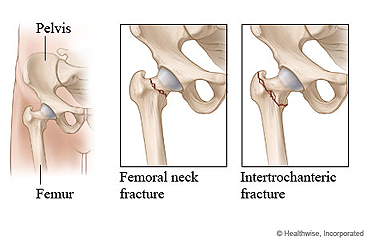Surgery to Repair a Hip Fracture: What to Expect at the Hospital

Your Recovery
After surgery to repair a hip fracture, you will spend a few hours in the recovery room, and then you will go to your hospital room. You may see a metal triangle called a trapeze over your bed. You can use this to help move yourself around in bed. You will be very tired and will want to rest. Your nurse may also help turn you as you rest.
You will probably still have a tube that drains urine from your bladder (urinary catheter). And you will probably be getting fluids through a tube in your vein called an I.V. You may also have a drain near the cut (incision) on your hip.
You may not feel hungry. You may feel sick to your stomach or constipated for a couple of days. This is common. Your nurse may give you stool softeners or laxatives to help with constipation.
You may have stockings that put pressure on your legs to prevent blood clots. Your nurse may also give you medicines and exercise instructions to help prevent clots.
Most people spend 2 to 4 days in the hospital. But depending on your health before the surgery, you may need to stay longer.
This care sheet gives you a general idea about how your recovery will begin in the hospital. Each person has a different experience and recovers at a different pace.
What will happen in the hospital?
Pain medicine
You'll get medicine to help control pain. Some are given through an I.V. or by a thin tube near your spine. Others are taken by mouth. If you still have a lot of pain after you take your medicine, tell your nurse.
Other medicines
- Your doctor will probably give you blood thinners to prevent blood clots in your leg. You will take this medicine during your hospital stay and when you go home.
Rehabilitation
- Your rehabilitation (rehab) will probably begin the day after your surgery. Your physiotherapist will get you started. It may be painful to exercise at first. But your nurse will give you pain medicine if you need it.
- Over the next few days, your physiotherapist will help you walk, go up and down stairs, and get in and out of bed and chairs. The physiotherapist will help improve your movement (range of motion) and strength in your hip.
- How quickly you regain strength and motion and do things on your own depends on how well you follow your physiotherapy. Your physiotherapist will teach you the exercises, but you must do them yourself.
- An occupational therapist will work with you. You'll learn how to bathe, dress, and do daily activities. You may need tools to help with everyday activities. Tools include long-handled sponges, shower stools, and shoehorns.
Diet
- You can eat your normal diet unless your doctor gives you other instructions. If your stomach is upset, try clear liquids and bland, low-fat foods. For example, you can eat plain toast or rice.
- You may have more fibre added to your meals to prevent constipation.
Incision care
- You will have a bandage over your incision. Your nurse will care for this.
Other instructions
- Your nurse or respiratory therapist will have you do breathing and coughing exercises to prevent problems such as pneumonia. Breathe in deeply through your nose, and slowly breathe out through your mouth. Do this 3 times, and then cough 2 times.
- You may have a device that you suck air through to help keep your lungs healthy (incentive spirometer). Use this as your nurse or respiratory therapist directs.
When should you call for help?
- You have trouble breathing.
- You have a cough, shortness of breath, or chest pain.
- You are sick to your stomach or cannot keep fluids down.
- You have signs of a blood clot, such as:
- Pain in your calf, back of the knee, thigh, or groin.
- Redness and swelling in your leg or groin.
- You are in pain, or your pain does not get better after you take pain medicine.
- You have loose stitches, or your incision comes open.
- You have signs of infection, such as:
- Increased pain, swelling, warmth, or redness.
- Red streaks leading from the incision.
- Pus draining from the incision.
- A fever.
Where can you learn more?
Go to https://www.healthwise.net/patientEd
Enter J339 in the search box to learn more about "Surgery to Repair a Hip Fracture: What to Expect at the Hospital".
Current as of: July 31, 2024
